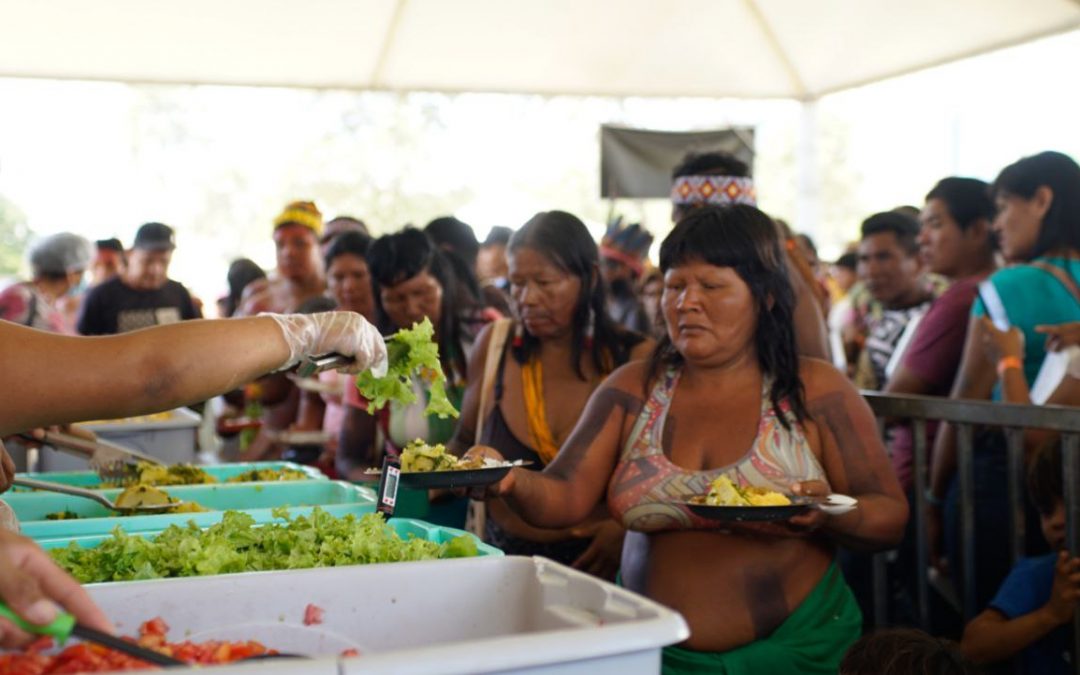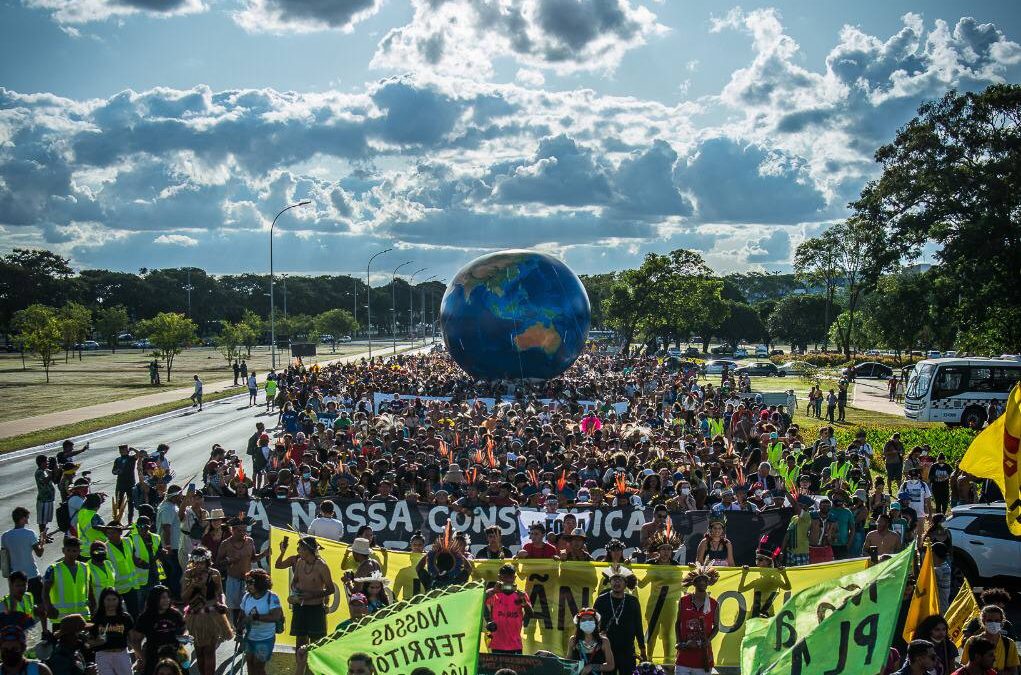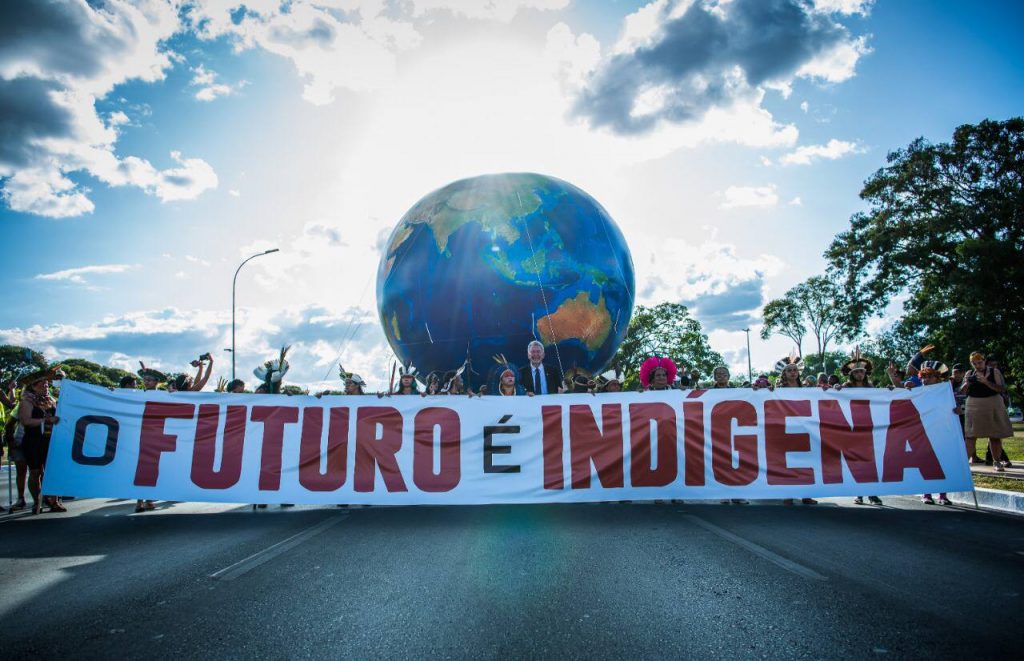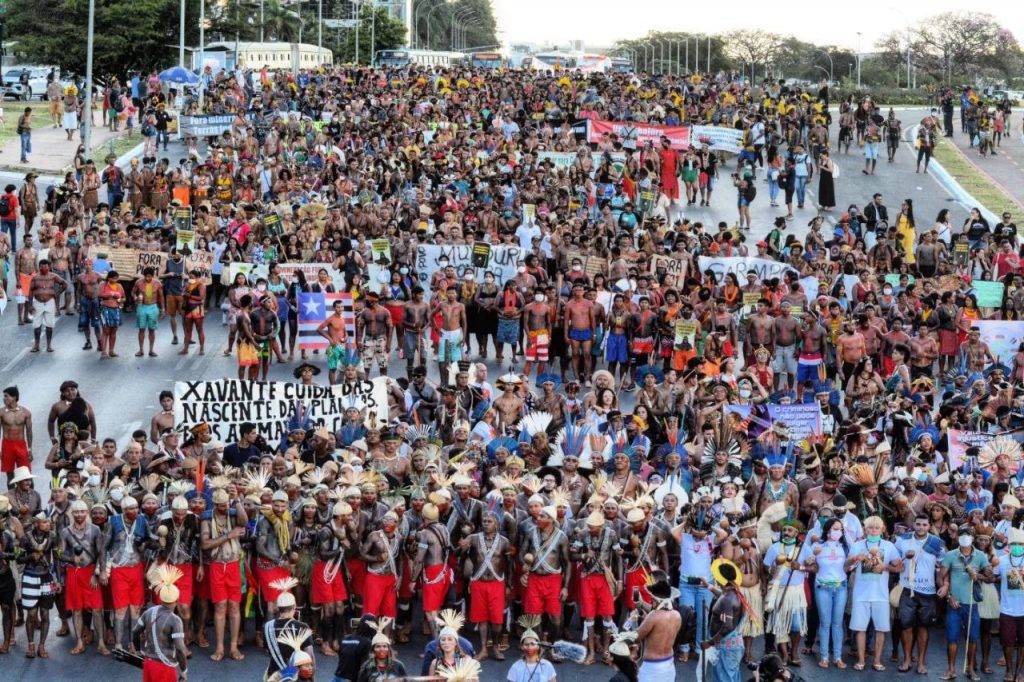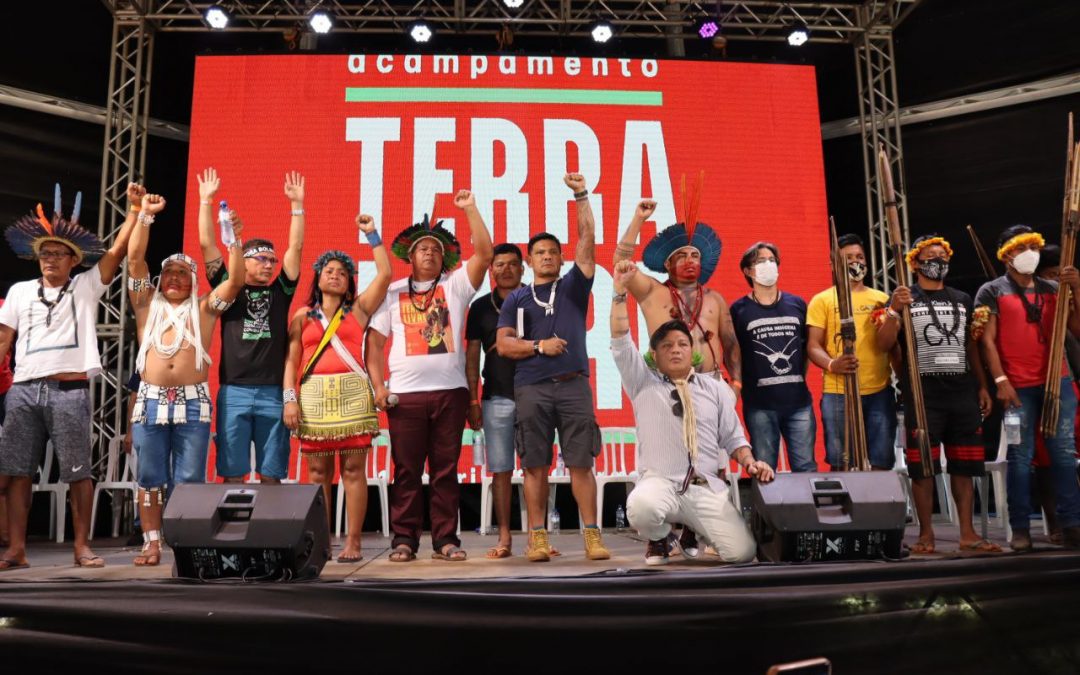
“We are not alone”: indigenous leaders in ATL 2022 join forces on behalf of isolated Indigenous Peoples and of recent contact
Photo: Pure Juma| COIAB’S communicator
At the Acampamento Terra Livre, in Brasilia, the panel “For the lives of isolated indigenous peoples and recent contact” warned about the attacks and setbacks suffered under the Bolsonaro government
The panel discussion was held this Thursday afternoon, 7, during the 18th Free Land Camp, and was mediated by the Executive Coordinator of Coiab, Angela Kaxuyana, with the participation of Tambura Amondawa, Adriano Karipuna, Junio Yanomami, from Roraima, Ronilson Guajajara, from Maranhão, Beto Marubo (Univaja), Lindomar Terena, Paulo Tupiniquim, Alfredo Marubo, Gilson Mayoruna and Luis Ventura, representative of the Indigenous Missionary Council (Cimi).
Many people do not know, but in Brazil there are several indigenous peoples who have chosen to live away from imposed “civilization”. They are peoples who, for centuries, have resisted colonization and the process of violence since the arrival of the white invader on Brazilian lands.
By choosing to remain in isolation, they seek to have greater control over the relationships they establish with groups or people around them and to continue living by their means, practices and habits. However, in recent years, under the Bolsonaro Government, the Brazilian State has refused to recognise their existence and guarantee their rights.
Beto Marubo, a member of the Union of Indigenous Peoples of the Javari Valley (Univaja), attributed the setbacks in the policy of protecting isolated indigenous people to a Bolsonaro policy of genocide of indigenous peoples, which has made the National Indian Foundation (Funai) a threat.
“The Funai was created to protect and should have a responsibility towards these Peoples. Although they are free, they are very vulnerable. Do you know what Funai is doing now? It is denying [the existence of] these Peoples,” emphasized Beto Marubo during the table.
To aggravate the situation, even today there are religious missions that have the intention of colonising the original culture. This represents a great epidemiological threat, which is added to deforestation and the invasion of groups that practice illegal extraction of gold, ore, wood and hunting for trade in these regions.
The Yanomami people are among those who have had the most recent contact. A video was shown with images of the mines inside their territories, the same ones that Bolsonaro proposes to regularize with PL 191. The scenario further accentuates the health problems that the isolated peoples have been facing.
Indigenous leader Júnior Hekurari, of the Yanomami people, president of the District Council for Indigenous Health Yanomami and Ye’kwana (Condisi-YY), stressed that several complaints have already been made at the national and international level about the violence suffered by the isolated and recently contacted peoples in their territories.
“The indigenous land is being invaded by miners. Our relatives are suffering from pneumonia. Every day a Yanomami child dies, the mothers cry together with the forest. More than 25 thousand miners are inside our lands, the miners have taken over the health centers, and the indigenous people are calling for help”, said the Indigenous leader.
Júnior estimated that around 7,000 are sick with malaria. In 2021 alone, 300 children died of the disease, almost one per day. For him, the policy of the Bolsonaro government promotes risk and extermination. “Now Sesai has become a military barrack. There are many colonels, many soldiers working there. The federal government does not plan to guarantee assistance within the community,” he lamented.
Alfredo Marubo, pointed out the deviations in the actions of Funai in this process. “Every day tons of game meat passes in front of the Funai headquarters and nobody does anything. They are doing nothing, they say that we are lying, they do nothing and even threaten the Peoples. Bolsonaro is putting anti-indigenous people to look after the villages, but they just go there for a walk and leave”.
With the ineffectiveness of federal bodies in protecting indigenous rights, exploitation has advanced over the forests and is getting closer every day to the isolated peoples.
In the plenary, the Peoples who had the first contacts centuries ago showed solidarity with these Peoples who are living autonomously in the forest. “We demand respect. We are using this cursed language because we were forced, we were humiliated. We saw our children growing up and dying. Today what is happening in the Amazon, we have already suffered. So we are here to say that you are not alone. We are together. This house belongs to the Indigenous Peoples of Brazil”, chief Júnior Pataxó,from the South of Bahia, expressed solidarity.
The Executive Coordinator of Coiab, Angela Kaxuyana, stressed the importance of this union for the protection of the isolated Peoples, since the Brazilian State has not fulfilled its role of protecting their territories, putting at risk the lives of these Peoples who decided to live in isolation after fleeing from massacres.
“On behalf of COIAB, of the Amazon, we want to express our gratitude and send a message to Bolsonaro that the Amazon is not alone, that it is the essence of this indigenous movement that will win, it is this essence of the indigenous movement that must remain here in the camp of respect, solidarity and a demonstration that we are together. And we have always known, my relatives, that we are never alone, because the Northeast and Apoinme are together with the Amazon”, Angela Kaxuyana concluded.
Deforestation alerts
In 2021, deforestation increased in indigenous lands with the presence of isolated indigenous Peoples, according to the Sirad-I bulletin of the Socio-environmental Institute (ISA). In the year, 3,220 hectares were deforested, with 904 alerts within the territories.
The alerts were concentrated, mainly, in the Piripkura (MT), Uru-Eu-Wau-Wau (RO), Araribóia (MA) and Munduruku (PA) Indigenous Lands. In addition, throughout 2021, it was also possible to detect major deforestation on the edges of these territories, which indicates a tendency of increasing invasions against the territories of these isolated Peoples.
The Araribóia Indigenous Land, located in Maranhão, was one of the most devastated by invasions by loggers and land grabbers, with more than 380 hectares deforested inside it. In addition, in 2021, arson attacks punished the territory.
Isolated or Decimated
The isolated or decimated campaign is headed by the Coordination of Indigenous Organizations of the Brazilian Amazon (COIAB) and the Observatory of Human Rights of the Isolated and Newly-Contacted Indigenous Peoples (Opi), and includes the participation of other organizations in the socio-environmental field, such as ISA, Survival International and Operation Native Amazon (OPAN). Launched on August 20, 2021, the campaign is focused on pressuring Funai for the renewal of four ordinances: Piripkura Indigenous Lands (MT), Jacareúba/Katawixi (AM) and Piriti (RR) and Ituna-Itatá IT (PA).
ACCESS: https://www.isoladosoudizimados.org/
Since last year, several actions have been carried out in order to alert public opinion to the current condition of isolated indigenous Peoples who are at risk of losing their territories, without legal and effective protection.
At the end of November 2021, Coiab launched a manifesto in defense of the life of isolated indigenous peoples, where it highlighted that the growing attacks and pressures on the territories are linked to the gradual weakening of FUNAI’s indigenous policy and the strengthening of the government’s anti-indigenous agenda.
Faced with the setbacks of protection by State agencies, the indigenous movement, together with its allies, is strengthening strategies to contain the invasions in the Indigenous Lands, with monitoring and autonomous protection actions in the territory, in order to protect their “isolated relatives”. In addition, they have made numerous complaints and brought legal actions to guarantee the legal protection of their territories and ways of life.

